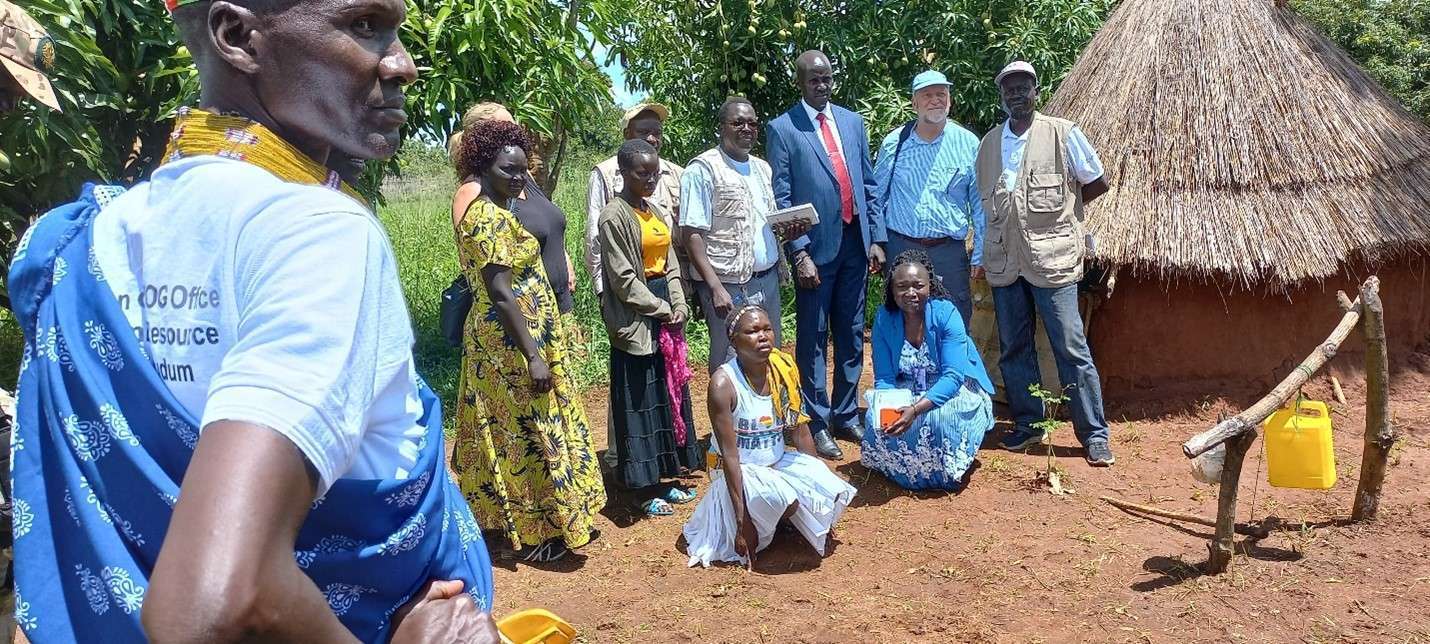
Mr John Dunam, Director, USAID/South Sudan Political Office, joined DT Global officials and local citizenry to inaugurate several new important community and sanitation centers in Chukudum town, Budi County, Eastern Equatoria State, South Sudan. DT Global implements two USAID projects in South Sudan: the Shejah Salam (“promoting peace”) social cohesion and resilience project and the Afia (“wellbeing” in Arabic) Water, Sanitation, and Hygiene (WASH) project. These two activities joined forces to organize a USAID visit to showcase their latest developments in rural South Sudan in early May.
Shejeh Salam officially handed over to local authorities a Traditional Authority Court and an office and community resource center managed by a Root of Generations, a local CSO. These new structures will support fair and accurate judgements, encourage female leadership, and create a safe space for community-based social interactions. The court will serve local communities by solving issues at the grassroots level and according to customary law, thus helping to reduce crime. The sustainable resource center will build the capacity of South Sudanese NGOs to better implement peace building initiatives.
The Afia WASH Project unveiled community-constructed latrines in Chukudum, Budi County as part of its community-led total sanitation effort nationwide. The latrines are anticipated to improve overall health and hygiene through providing access to safe sanitation facilities, ideally leading to the eradication of open defecation across several villages in the county.
In Afia WASH’s community-led total sanitation approach, communities are triggered to build latrines using locally sourced materials to promote sustainability. This approach promotes and increases the adoption of key sanitation and hygiene practices. Within its first two years of operations. Afia WASH has empowered target communities where 654 families constructed their own latrines using locally available materials benefiting over 4585 household members and thus reducing the practice of open defecation.
USAID, through the Shejeh Salam and Afia WASH projects, supports improved water infrastructure, access to safe drinking water, the development of traditional authority leadership systems and locally led community development in South Sudan. Currently within their third year of operations, the two programs work on a grass roots level and are realizing tangible results in USAID’s 13 target South Sudanese counties that are home to some of the most vulnerable groups within the country.
Shejeh Salam empowers citizens across a wide range of contexts and populations in South Sudan to advance peace, stability, dialogue through local solutions, civic participation, and increased access to information. The program operates on a grassroots level by issuing small grants to a wide range of local actors who understand their communal contexts best. With 150 small grants issued to date, Shejeh Salam is able to effectively reach target communities.
Shejeh Salam has held nearly 300 peacebuilding events reaching almost 50,000 citizens, supported almost 40 local CSOs, and enabled almost 5,000 people to benefit from trauma awareness workshops. To help spread peace and reconciliation messages, the program has distributed 2500 radios to-date, supported several non-state news outlets and trained almost 120 journalists in the provision, production and dissemination of fair and unbiased news.
Afia WASH’s achievements in community-led total sanitation are part of a wider movement to promote bottom-up solutions through its field work activities. In its first year of implementation, Afia WASH established 30 Water Management Committees across five counties with the intention of empowering local communities to sustain new and existing water infrastructure. Each Water Management Committee has generated and managed funding from water use collection fees at water access which later cover the cost of repairs and renovations. Composed of 303 members, the Water Management Committee have each received training sessions and recently engaged with South Sudan’s Pump Mechanic Association to form a longstanding collaboration on maintaining the project’s water points.
Both DT Global implemented project operate with a strong focus on women, youth, people with disabilities, and other disadvantaged groups. Together with USAID, DT Global’s South Sudanese activities are helping build a stable South Sudan able to provide well-being, peace, and healthy sanitation services to all its citizens.